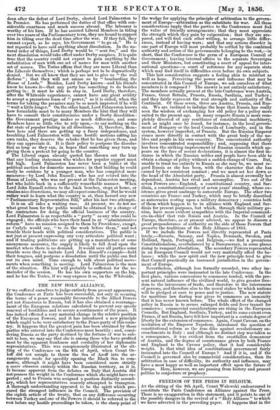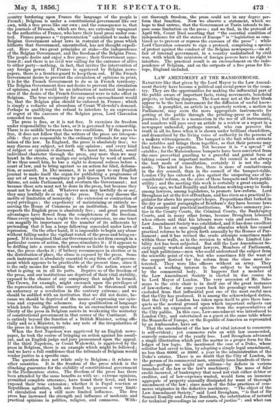FREEDOM OF THE PRESS IN BELGIUM.
AT the sitting of the 8th April, Count Walewski endeavoured to constitute the Paris Conference an Alliance against the Press. There is no exaggeration in this statement, and it points to one of the possible dangers in the revival of a "Holy Alliance" to which we have adverted in the preceding paper. It happens that in the
country bordering upon France the language of the people is French; Belgium is under a constitutional government like our own, with a fi•ft press like our own ; and the consequence is, that • the journals of Brussels, which are free, are extremely repugnant to the authorities of France, who have their local press under con- trol. France proposes a "representation" calculated to make the Belgian Government adopt laws in restraint of the press which hitherto that Government, uncontrolled, has not thought expedi- ent. Here are two great principles at stake—the independence • of the Belgian Government, and the freedom of the Belgian Press. The people desire and enjoy a free press ; their Government sanc- tions it; and there is no civil war calling for the entrance of allies
• to either party—nothing' in fact, that invites the intervention of any foreign power. If France is aggrieved by Belgian news- papers, there is a frontier guard to keep them out. If the French Government desire to prevent the circulation of opinions in print, it is for the French Government to do so in French territorry. The Belgian Government does not desire to prevent the circulation of opinions, and it would be an infraction of national independ- ence if the desire of the French Government were to take effect in Belgium. The true reciprocity for any such encroachment would be, that the Belgian plan should be enforced in France ; which is simplya reductio ad absurdum of Count Walewsld's demand. Perhaps in qnsltfying the refusal to interfere by an expression of regret at the excesses of the Belgian press, Lord Clarendon conceded too much.
The press is free, or it is not free. It exercises its freedom under responsibility to the laws, or it is governed by a censorship. There is no middle between these two conditions. If the press is free, it does not follow that the writers of the press are irrespon- sible: they are responsible to the ordinary tribunals for any vio- lation of the law. In England, the press is absolutely free ; we may discuss any subject, set forth any opinion ; and every kind of subject or opinion is discussed. We must not, indeed, assail individual character through the press, any more than we may brawl in the streets, or malign our neighbour by word of mouth. If we thus assail him, he has a right to demand redress before a court of law, and to bring against us an action for libel, defama- tion, or assault. In like manner, it is not open to any English journal to make itself the organ for publishing a programme of any set of men for a conspiracy to pull Queen 'Victoria from her throne, set aside Parliament, and overturn the Government ; not because these acts must not be done in the press, but because they must not be done at all. Whatever men may lawfully do or say, they may lawfully do or say in the press. They may discuss the merits or limitation of monarchy; the extension or contraction of royal privileges ; the expediency of maintaining or entirely re- moving the House of Commons as an institution. In all these respects the English press is absolutely free ; and great practical advantages have flowed from the completeness of the freedom. Since every opinion has a right to its own expression' no one tenet can magin.fy its importance or the number of its adherents by pretending that it has a large following concealed under laws of repression. On the other hand, it is impossible to begin any abuse without falling under the vigilant watch of the press and being ex- posed. If it is imagined that our Government is not firm enough in a particular course of action, the press stimulates it ; if it appears to be drifting into a course which renders us liable to an unpopular war' the press checks it ; if bribery recommences in election or in the distribution of place, the abuse is exposed by the press. Some such instrument is absolutely essential to any form of self-govern- ment which appears to be practicable at the present time, since it is the only means for making the whole of the nation aware of what is going on in all its parts. Deprive us of the freedom of the press and our institutions are deprived of their vital stability, exposed io the chance of any conspiracy that might be formed. The Crown, for example, might encroach upon the privileges of the representation, until the country should be threatened with an autocracy or a revolution in the contrary extreme ; and we should be saddled with an institution that we did not desire, be- cause we should be deprived of the means of expressing our opin- ions and exposing the schemers. Any qualification of language which lends the slightest sanction to an encroachment upon the liberty of the press in Belgium assists in weakening the mainstay of constitutional government in that corner of the Continent. It is entirely beyond the function of a British Minister, acting offi- cially and as a Minister, to take any note of the irregularities of the press in a foreign country.
When the first Napoleon was aggrieved by an English news- paper, he took the course of bringing an action against his assail- ant, and an English judge and jury pronounced upon the appeal. If the third Napoleon, or Count Walewski, is aggrieved by the press in Belgium there is an example which might be followed ; and we have a full confidence that the tribunals of Belgium would. render justice in a specific ease.
The question does not relate only to Belgium ; it relates to other countries. It is the freedom of the press which is the clinching guarantee for the stability of constitutional government in the Piedmontese states. The freedom of the press has there been attended by the same benefits as with us : extreme opinions, permitted complete utterance, have found their level, and have exposed their true extension ; whether it is Papal reaction or Republican agitation, both are found to possess a very limit- ed circulation and a still more limited influence. The free press has increased the strength and influence of moderate and practical opinions in politics, religion, and commerce. With- out thorough freedom, the press could not in any degree per- form that function. Now we observe a statement, which we hope to find untrue, that the Governnient at Turin intends to im- pose some limitation on the press • and we find, in the protocol of April 8th, Count Buol asserting press; "the essential .condition of independence for all the states of Europe " is "legislation so com- bined as to prevent or repress the excesses of the press" ; while Lord Clarendon consents to sign a protocol, comprising a species of protest against the conduct of the Belgian newspapers' —an af- fair of internal government, in a country undisturbed by civil war, with which the ministers of foreign powers have no right to interfere. The practical result is an encroachment on the inde- pendence of Belgium and on the outposts of a free press for Eu- rope, England included.







































 Previous page
Previous page